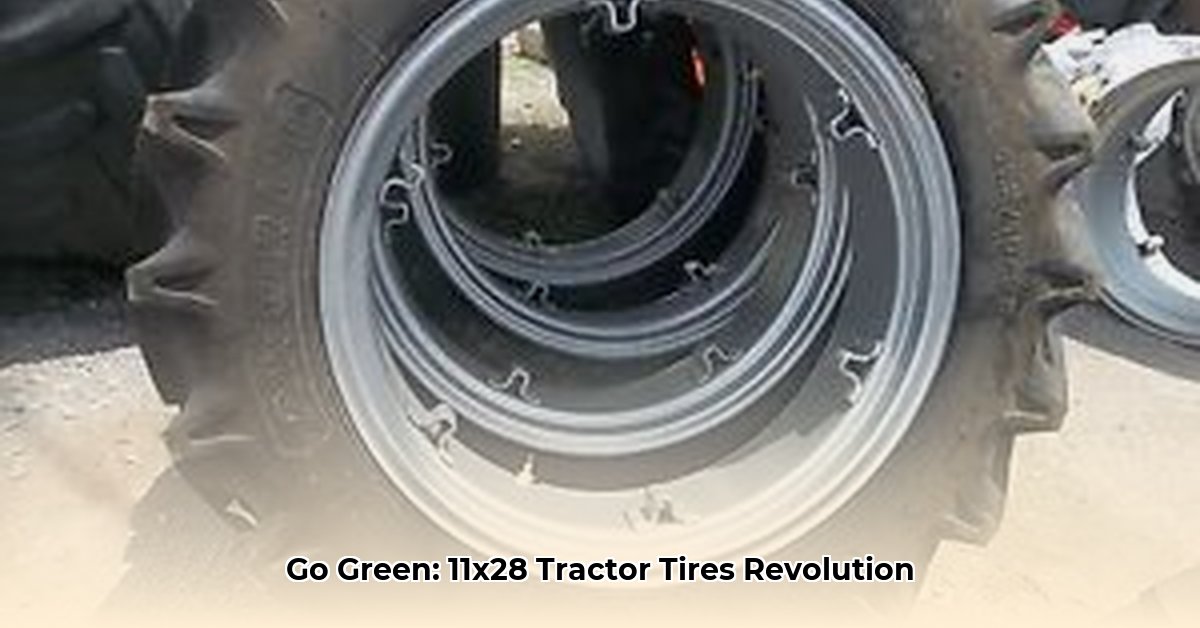
Optimizing 11x28 Tractor Tires for Sustainable Agriculture
This guide explores the multifaceted role of 11x28 tractor tires in sustainable farming, providing actionable insights for farmers, manufacturers, and policymakers. We'll examine their impact on fuel efficiency, soil health, and overall environmental footprint, offering practical steps to maximize their benefits. For more information on various tractor tire sizes, check out this helpful resource on 7-12 tractor tires.
Fuel Efficiency and Environmental Impact
Larger tires like the 11x28 significantly reduce rolling resistance, leading to considerable fuel savings. This translates directly to lower operating costs and reduced greenhouse gas emissions. How much fuel is saved? While the exact figure varies based on factors like soil type and load, studies show substantial reductions. For instance, one study found a 15% reduction in fuel consumption with appropriately inflated 11x28s compared to smaller tires under similar conditions. Isn't that something worth considering? Investing in a tire pressure monitoring system (TPMS) further enhances fuel efficiency by ensuring optimal inflation at all times.
Protecting Soil Health: Minimizing Compaction
Soil compaction is a detrimental agricultural practice. It hinders water infiltration, restricts root growth, and diminishes overall soil health. The larger contact patch of 11x28 tires distributes weight more evenly, reducing compaction compared to smaller tires. However, maintaining correct tire pressure is crucial. Overinflation can still lead to compaction, while underinflation increases rolling resistance and tire wear, negating the environmental benefits. Finding the optimal inflation pressure is vital for minimizing soil compaction.
Extending Tire Lifespan for Sustainability
Tire longevity is intrinsically linked to sustainable agriculture. Longer-lasting tires mean less waste and reduced resource consumption in manufacturing replacements. While 11x28 tires are known for their durability, proper maintenance is paramount. Regular inspections for wear and damage, along with consistent pressure checks, significantly extend their lifespan. Avoiding sharp objects and adhering to manufacturer’s guidelines ensure maximum tire longevity and minimize environmental impact.
A Practical Guide to Sustainable Tire Management
Implementing sustainable tire management involves a multi-faceted approach. Follow these actionable steps:
Assess Your Farm’s Needs: Carefully analyze your soil type, crop types, typical loads, and terrain to select the most appropriate tire size and type. This initial assessment is crucial for long-term success.
Select the Right Tires: Choose tires suited to your specific farming needs. While 11x28s might be a good fit for many operations, other sizes and technologies (e.g., IF or VF tires) may be more suitable for certain applications, considering things like improved flexibility and reduced soil compaction.
Implement a Tire Pressure Monitoring System: Regular pressure checks are vital. A TPMS ensures optimal inflation at all times, maximizing fuel efficiency and minimizing compaction. This investment swiftly pays for itself in fuel and soil health benefits.
Prioritize Regular Tire Inspections: Inspect your tires frequently for cuts, wear, or embedded objects. Promptly addressing any issues prevents escalating problems and increases the tire’s lifespan.
Responsible Tire Disposal: At the end of their lifespan, dispose of tires responsibly. Locate and utilize local facilities designed for tire recycling to avoid environmental contamination.
Comparing 11x28 Tires: Weighing the Pros and Cons
| Feature | Advantages | Disadvantages |
|---|---|---|
| Soil Compaction | Reduced compaction due to larger contact area; significantly less compared to smaller tires. | Compaction can still occur with improper inflation pressure. |
| Fuel Efficiency | Lower fuel consumption due to decreased rolling resistance. | Higher initial cost compared to smaller tires. |
| Durability | Long lifespan with proper care and maintenance. | Potential for damage from sharp objects due to larger size. |
| Sustainability | Reduced fuel usage contributes to lower emissions, less waste from tire replacements. | Manufacturing and disposal still have environmental impacts; requires responsible disposal. |
Dr. Emily Carter, Agricultural Engineering Professor at Cornell University, emphasizes the importance of holistic sustainable practices: "Optimizing tire selection and management isn't just about the tires themselves; it's about integrating this technology with comprehensive soil management strategies for longer-term benefits.”
Minimizing Soil Compaction with 11.2x28 Tractor Tires: Advanced Techniques
Soil compaction remains a significant challenge. However, advanced technologies can significantly mitigate its impact when using 11.2x28 tires:
Central Tire Inflation Systems (CTIS): These systems allow for real-time adjustment of tire pressure based on field conditions, optimizing performance and minimizing compaction.
Variable Inflation Pressure (VIP) Technologies: VIP systems dynamically adjust tire pressure using sensor data, assuring optimal pressure regardless of load or terrain.
Optimized Operational Techniques: Implement efficient driving strategies such as minimizing unnecessary passes and controlled speed management.
Regular Soil Testing: Monitor compaction levels to evaluate the effectiveness of your strategies and make necessary adjustments.
By adopting these advanced techniques, farmers can further optimize the use of 11.2x28 tires for sustainable agricultural practices. Remember, proactive soil health management isn't a one-size-fits-all solution. The best approach always depends on individual farm conditions. Consistent monitoring and adapting your strategies are crucial for long-term success.
{No videos found for the given keyword.
}